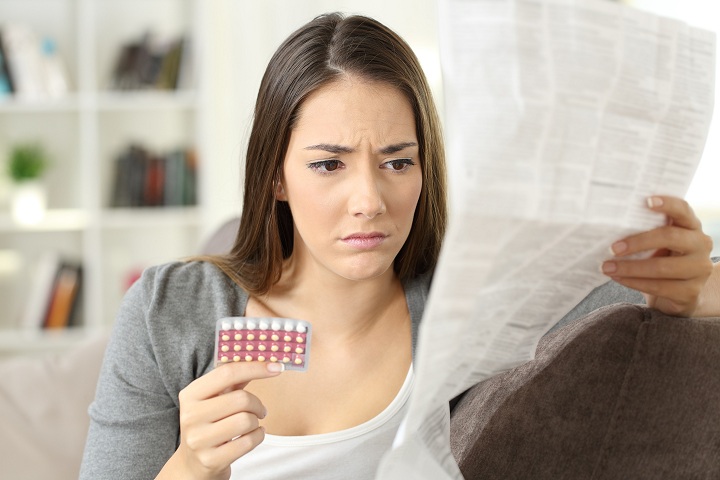Acne is a painful and traumatic condition that affects millions of people. They can, unfortunately, happen at any point in a person’s life, not only during their adolescent years. Acne can be particularly difficult to treat in women, as it is frequently linked to hormonal variations associated with the menstrual cycle and perimenopause.
Hormonal adult acne, unlike adolescent acne, is persistent and, if left untreated, can cause physical and mental distress. Hormonal birth control is one of the safest and most efficient ways for people with uteruses to address stubborn breakouts.
Taking the birth control pill can provide health advantages such as better skin, reduced stress, and greater self-esteem for both teens and adult women.
What’s the Link Between Hormones and Acne?
Acne occurs when your skin’s hair follicles become blocked with oil, debris, and dead skin cells. While nutrition, certain products, the environment, and some drugs can all play a role in the problem, the underlying cause is frequently a hormonal issue.
Androgens frequently referred to as male hormones, are found in men’s bodies. Since androgens (particularly testosterone) cause sebum production, sebum (a waxy, greasy material) clogs pores and causes breakouts, excessive levels of androgens frequently result in acne.
Acne, Women, and Hormones
Because puberty is a period of life marked by increased androgens, hormone-related acne is common among young teenagers. However, hormone variations in girls and women occur every month before, during, and after their menstrual cycles, which can cause or aggravate acne well into adulthood.
If you’re like most women, your greatest androgen level occurs approximately a week before your period, which might explain why you break out right before your period.
Then, during your period, your estrogen level goes up, and your progesterone level goes down.
But menstruation isn’t the only thing that affects your hormones. Stress, medications, and pregnancy can all shake up your “normal” and leave you with a pimply face, chest, or back.
Can Birth Control Treat Acne?
To treat stubborn acne, a doctor may prescribe birth control tablets.
Yes, in a nutshell. In reality, the Food and Drug Administration (FDA) has authorized various types of birth control pills to treat acne.
The birth control pill is the best alternative when standard and over-the-counter acne care treatments have failed. Cleansers, creams, and spot treatments are among the available alternatives.
According to the American Academy of Dermatology, females with severe acne around the lower face, chin, neck, chest, and back could be particularly ideal candidates for hormone therapy, especially if previous therapies, such as topicals or antibiotics, have failed.
Who Can Take Birth Control for Acne?
To use birth control for acne, you must be at least 14 to 15 years old, depending on the type of birth control, and you must have begun menstruation. Your doctor will also examine you to make sure you don’t have any health problems that can make using birth control harmful, such as:
- Visual changes (called an aura) accompany migraine headaches
- if there is a history of blood clots or blood clotting disorders
- High blood pressure
- Smoking
- Age over 35
- The disease of the liver or gallbladder
- Breast or uterine cancer history
If you use estrogen-containing birth control pills and have a history of migraines with headaches, blood clots, or high blood pressure, you’re more likely to have a stroke. That’s also true for women over 35, especially if they smoke.
In liver or gallbladder problems, birth control tablets might aggravate the condition. The use of birth control may not be an option for women who have had breast or uterine cancer in the past since the extra estrogen may cause the disease to return.
Birth Control Pills and Their Side Effects
Birth control tablets are usually considered to be safe. On the other hand, side effects are prevalent and can vary from moderate to severe.
Here are some particular adverse effects of the pill:
- Periodic bleeding or spotting
- breast tenderness
- headaches
- nausea
- mood swings
- depression
- breast growth
- weight changes
Patients with a history of migraine with aura should take the tablet if they have major health problems. Blood clots, heart attacks, strokes, and liver cancers are among these disorders.
Conclusion
If you’ve had acne for a few weeks or a few years, you’re probably excited to cure it fastly. Don’t put off talking to your skin specialistabout this common skin problem because it can damage your self-image and quality of life. Ask whether an oral contraceptive can be beneficial and what kinds of adverse effects to expect.
FAQs
1. What birth control helps clear acne?
Using a combination pill that includes estrogen and progestin is the best birth control pill for acne. Ortho Tri-Cyclen, Estrostep Fe, Beyaz, and Yaz are four birth control tablets that the FDA has authorized for curing acne.
2. What does hormonal acne look like?
Blackheads, papules, pustules, cysts, and nodules are all common hormonal acne symptoms. Normally, whiteheads and blackheads do not cause pain, inflammation, or swelling, but if they do, then they are most likely forming into cysts and abscesses.
3. What triggers hormonal acne?
It is triggered by fluctuations in your hormones, particularly testosterone. An increase in testosterone may cause the sebaceous glands to produce more sebum. Clogged pores and acne result from sebum combining with debris, germs, and dead skin cells.

